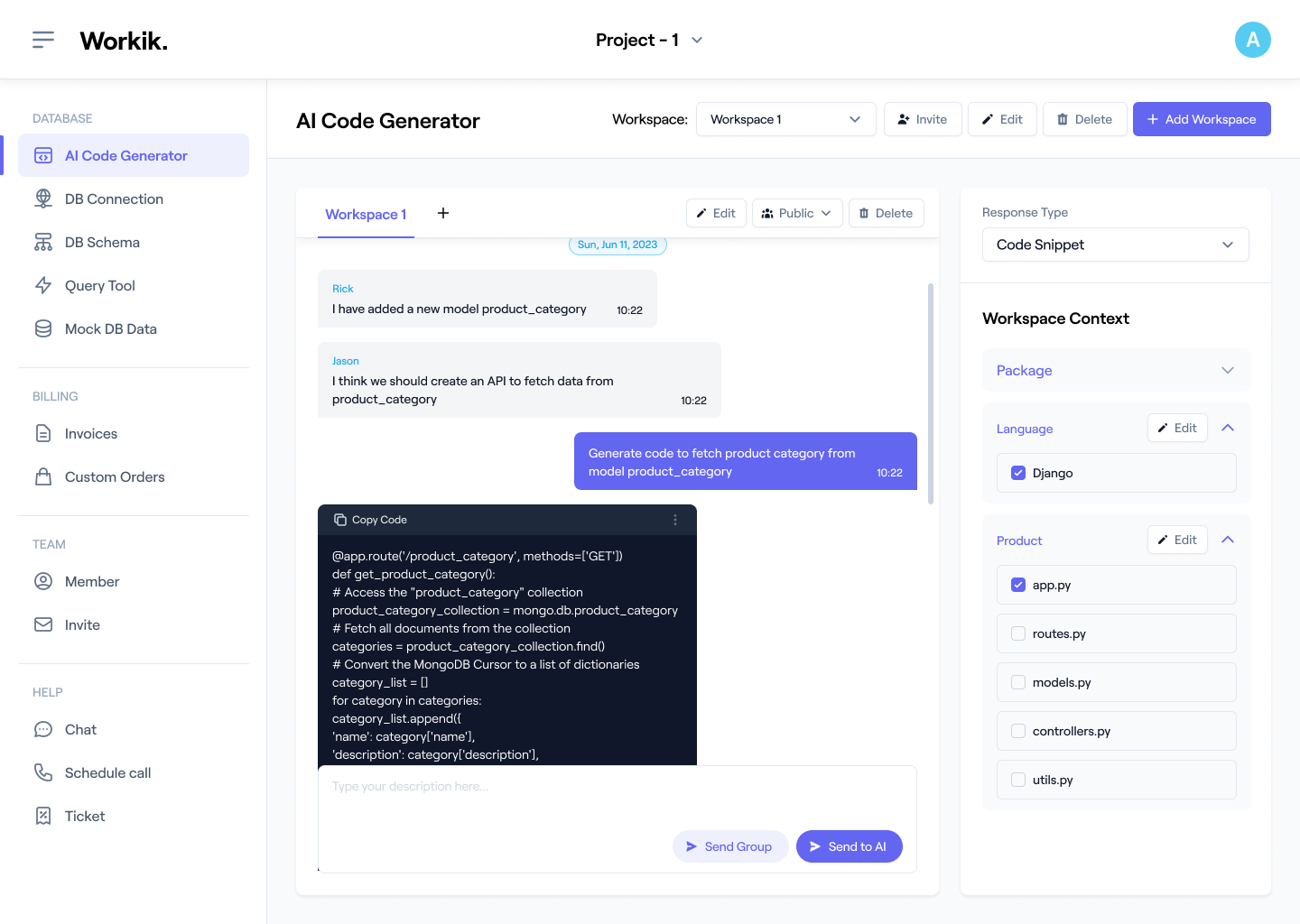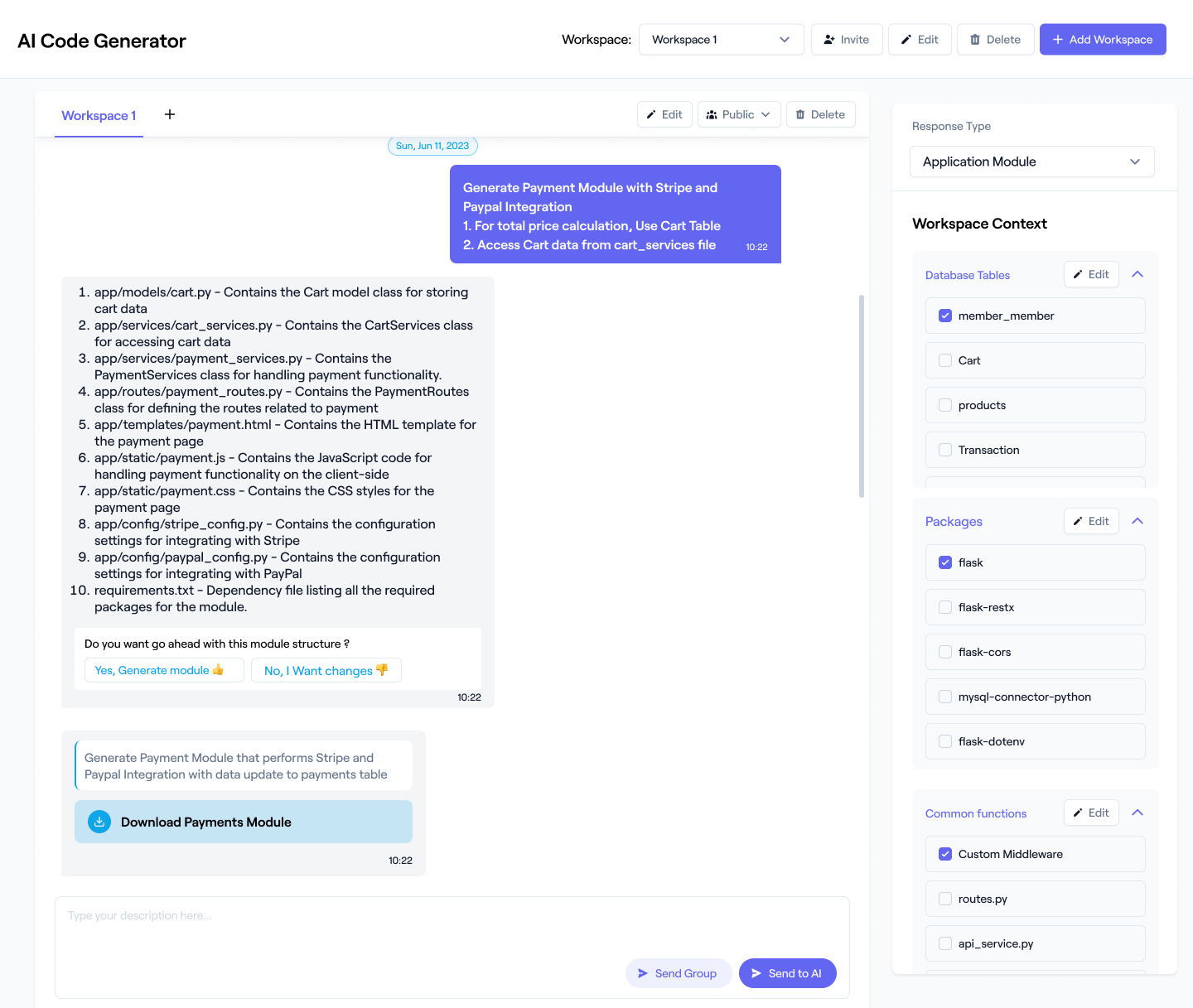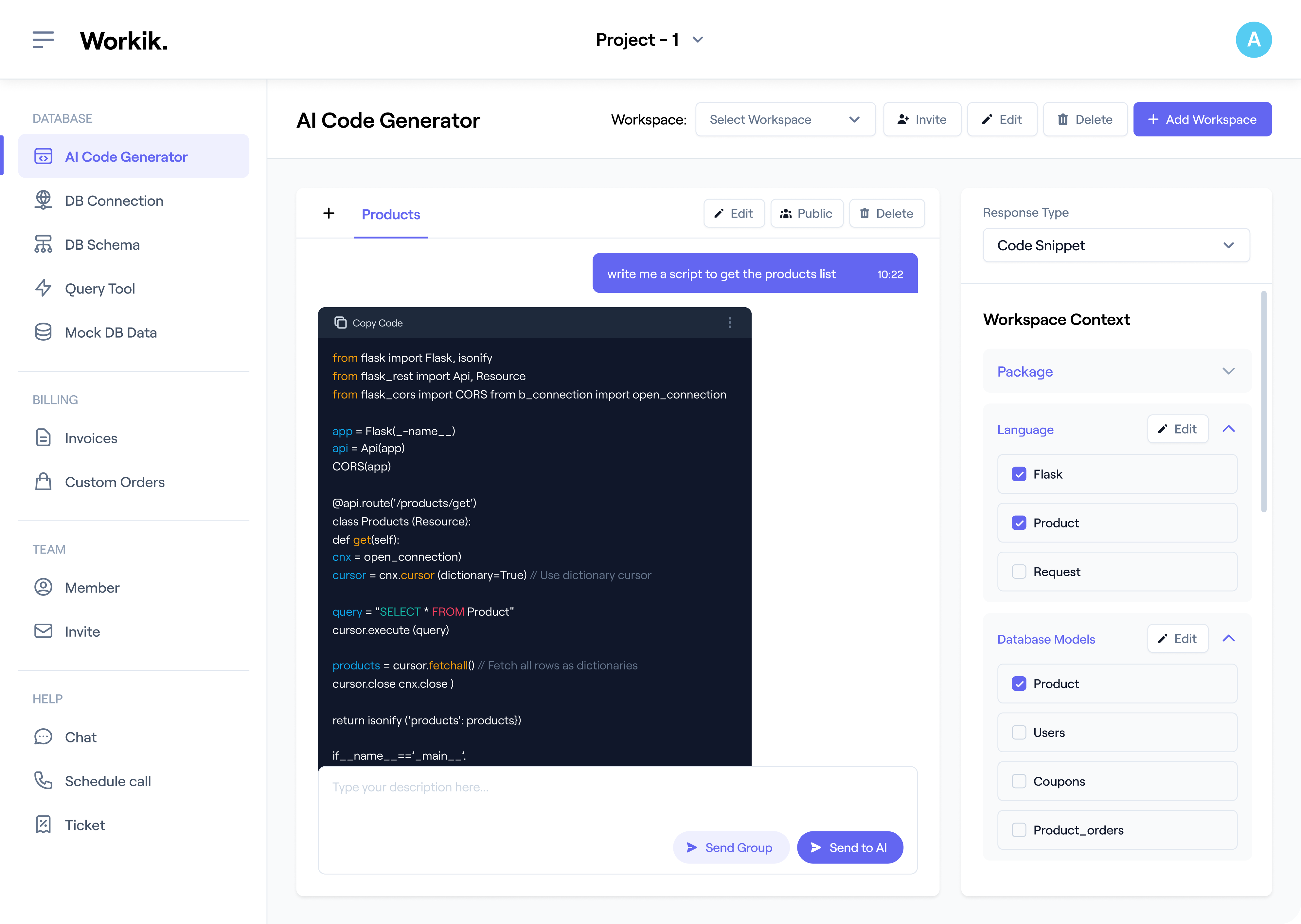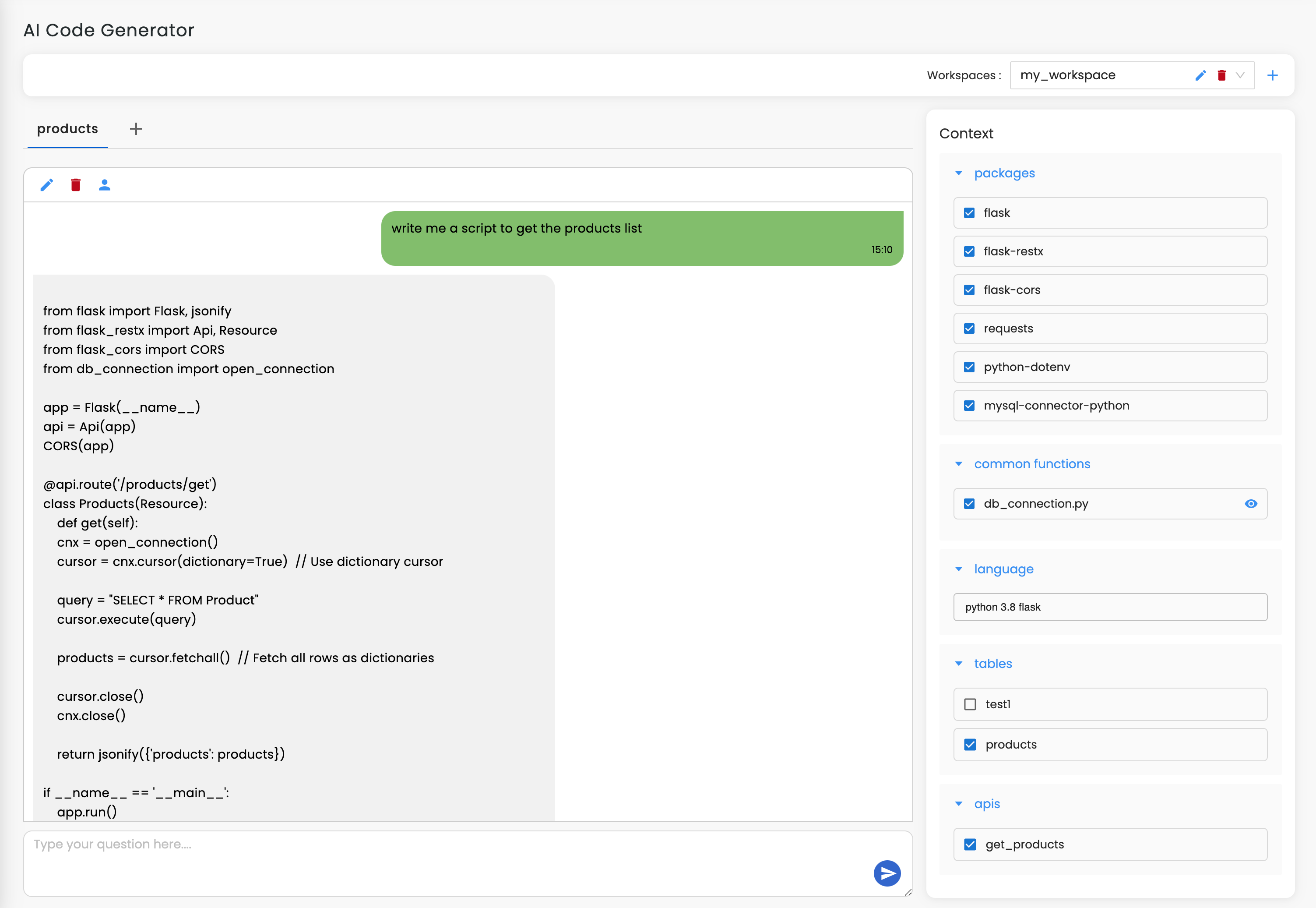
Join our community to see how developers are using Workik AI everyday.
Features

Automate Content Models
Configure Netlify CMS content models in Markdown, YAML & more, ensuring compatibility with Gatsby and Next.js using AI.

Streamline Git Workflow
AI automates branch creation, pull requests, and commits, supporting GitHub, GitLab, and Bitbucket workflows.

Create Custom Widgets
Generate widgets for media, text, and custom fields, integrating them smoothly into Netlify CMS using AI.

Secure Content Access
Set up OAuth and role-based permissions with AI automating access control to secure Netlify CMS workflows.
How it works
Sign up with Google or manually to access Workik’s AI tools for Netlify CMS integration.
Link your GitHub, GitLab, or Bitbucket repositories and specify frameworks like Gatsby, Hugo, or more. Add Netlify CMS collections and fields to give AI the structure it needs.
Enter project details, and AI generates Netlify CMS structures, configures API endpoints, and refines publishing. Leverage AI for streamlined debugging and SEO enhancements in content management.
Invite team members to review and update content, manage workflows, and deploy changes instantly to Netlify staging for seamless publishing.


Expand


Expand


Expand


Expand


Expand


Expand


Expand


TESTIMONIALS
Real Stories, Real Results with Workik
AI-generated collections and fields speed up our Netlify CMS setup, making dynamic content updates easy.

Alfredo Mendez
Frontend Developer
With Workik’s AI, automating Git workflows is a breeze, ideal for efficient team projects.

Vivian House
Full Stack Developer
The custom widgets generated with AI give our content team more flexibility, and setup is lightning fast.

Alanna Mayers
Content Engineer
What are some popular use cases of Workik’s AI-powered Netlify CMS Code Generator?


Workik’s AI-powered Netlify CMS Code Generator supports a range of Netlify CMS-focused development tasks, including:
* Automating setup of content collections and fields for streamlined content management.
* Integrating custom widgets for unique content needs within Netlify CMS.
* Simplifying Git-based workflows with automated branch creation and commits.
* Rapid setup of Markdown or YAML content models for frameworks like Gatsby or Next.js.
* Setting up role-based permissions and OAuth to control access and secure content.
* Configuring API endpoints for real-time content delivery to multiple frontends.
* Optimizing media management with AI-driven lazy loading, image compression, and custom media folders.
* Automating metadata and SEO settings to enhance search visibility and performance.
* Generating multi-language content structures to support global and localized sites.
What context-setting options are available in Workik’s AI for Netlify CMS?


Workik offers diverse context-setting options specific to Netlify CMS, enabling users to:
* Connect repositories from GitHub, GitLab, or Bitbucket.
* Specify frameworks like Gatsby, Hugo, or more for compatibility.
* Define collections, fields, and media folders for structured content.
* Configure user roles and permissions to manage content access.
* Set up OAuth for secure access control within Netlify CMS.
Does Workik support compliance and accessibility in Netlify CMS?


Yes, Workik’s AI can help configure accessibility-focused content models and metadata for compliance with SEO and accessibility standards, including ARIA labels and alternative text fields for images.
How does Workik AI improve performance for Netlify CMS?


Workik configures lazy loading, image compression, and caching to enhance load times, optimizing high-traffic sites for speed and responsiveness.
Is Workik’s AI suitable for scaling content in Netlify CMS?


Yes, Workik’s AI is designed for scaling. It auto-generates flexible collections and widgets, making it easy to add and manage large volumes of content. Whether scaling for new collections or multi-author input, Workik’s automation keeps CMS structure consistent and efficient.
How does Workik AI assist in scaling Netlify CMS for enterprise-level projects?


Workik AI automates large-scale CMS setups with:
* API-driven content distribution for multi-platform delivery.
* Scalable collections and widgets tailored for high-volume content.
* Git-based workflows supporting multi-author collaboration with automated branch management.
* Optimized caching and CDNs for high-traffic environments.
How does Workik AI ensure secure access control and OAuth setup for Netlify CMS?


Workik automates OAuth workflows and RBAC, integrating with Netlify Identity, Auth0, or Okta. It secures API access with encrypted token storage and audit-ready role configurations, ensuring granular control and compliance.
Can Workik AI assist with SEO integrations for Netlify CMS projects?


Workik automates SEO by:
* Embedding Schema.org metadata and generating sitemaps/robots.txt.
* Integrating Google Search Console for real-time SEO tracking.
* Configuring Open Graph and dynamic meta tags for better search visibility and sharing.
Generate Code For Free

Netlify CMS: Question and Answer
Netlify CMS is an open-source, Git-based CMS optimized for JAMstack, allowing users to manage content with static site generators like Gatsby, Hugo, and Jekyll. Using Markdown and YAML, it’s a headless CMS that enables content editing directly in Git.
Commonly used tools in Netlify CMS development include:
Languages:
JavaScript, Markdown, YAML
Frontend Frameworks:
Gatsby, Hugo, Next.js, Jekyll
APIs:
Git Gateway, OAuth for authentication
Libraries:
React, Redux, Axios
Deployment:
Netlify, Vercel, GitHub Pages
Testing:
Cypress, Jest, Postman
Styling:
Tailwind CSS, Bootstrap
Popular use cases for Netlify CMS include:
Blogs and Content Sites:
Easy-to-manage Markdown-based content with fast deployment.
Portfolio Sites:
Dynamic content management for personal and creative portfolios.
Corporate Sites:
Scalable setup for landing pages and promotional sites with Git-based control.
Documentation Sites:
Structured content organization for open-source documentation.
Multi-Platform Content Distribution:
Delivers content to various frontend frameworks through Git integration.
Expertise in Netlify CMS opens roles like JAMstack Developer, Frontend Developer, CMS Integrations Engineer, and Content Engineer, involving tasks like content model setup, Git-based workflows, API integrations, and custom widget development to support flexible, Git-centric content management.
Workik AI simplifies Netlify CMS workflows by:
Widget Creation:
Builds media galleries, sliders, and custom fields.
Git Automation:
Manages branches, PRs, and commits.
Access Control:
Sets up OAuth and role-based permissions.
Staging & Deployment:
Enables previews and staging for testing.
Dynamic Content:
Configures API endpoints for real-time updates.
SEO Setup:
Automates metadata for search visibility.
Testing:
Integrates Cypress and Jest for smooth testing.
Debugging & Refactoring:
Enhances code quality for maintainability.
Optimization:
Boosts performance for faster operations.
Explore more on Workik
Get in touch
Don't miss any updates of our product.
© Workik Inc. 2026 All rights reserved.

